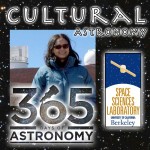Podcaster: Nancy Alima Ali
 Title: Cultural Astronomy – Agriculture, Ecology, Awe and the César Chávez Solar Calendar
Title: Cultural Astronomy – Agriculture, Ecology, Awe and the César Chávez Solar Calendar
Organization: Multiverse, Space Sciences Lab, University of California at Berkeley
Links: http://multiverse.ssl.berkeley.edu/, http://www.astroalima.com, http://solarcalendar.org/
Description: Santiago Casal, founder and project director of the César Chávez Solar Calendar talks with Nancy Alima Ali from UC Berkeley’s Space Sciences Lab about the connections between agriculture and solar calendars. Topics discussed include solar alignment sites from around the world, the legacy of César Chávez as a labor activist for farm workers, a description of the César Chávez Solar Calendar in Berkeley, how learning lessons from ancient cultures can help us answer the call of the ecological age, and the importance of reconnecting to our collective sense of awe.
Bio: Nancy Alima Ali, M.Ed., is a Coordinator of Public Programs at Multiverse at the Space Sciences Lab at the University of California, Berkeley. For over 15 years, Ms. Ali has been active in both formal and informal education as a classroom teacher, college instructor, museum educator, curriculum developer and program manager. Ms. Ali has a particular interest in exploring the ways in which multiple worldviews contribute to our understanding of the cosmos. She blogs about the intersection of astronomy and culture at www.astroalima.com.
Guest Bio: Santiago Casal is the Founder and Project Director of The Solar Calendar – A César E. Chávez Memorial in Berkeley, California. Santiago’s career spans 45 years as a university administrator and faculty member in Sociology at Antioch College, diversity consultant, award winning public radio producer, designer/builder, and community leader. As an avocation he has travelled the world to study over 30 ancient archeological sites many of which have solar/celestial orientations and calendars build into their architecture.
Today’s sponsor: This episode of “365 Days of Astronomy” is sponsored by — no one. We still need sponsors for many days in 2015, so please consider sponsoring a day or two. Just click on the “Donate” button on the lower left side of this webpage, or contact us at signup@365daysofastronomy.org.
Transcript:
Welcome and introductions – Santiago Casal
Summer solstice – what it is, when it happens
Solstice sites that Santiago has visited around the world
Santiago’s introduction to solar alignments at Uaxactun in Guatemala
Tracking of rising and setting points of sun along horizon over the course of a year
César Chávez Solar Calendar in Berkeley, California
Purposes of site: build a solar and lunar calendar based on ancient design concepts, honor life and legacy of agriculture labor leader César Chávez, establish an outdoor learning space, create a space for contemplation
Description of solar calendar
Determining the solstice and equinox alignments of solar calendar; long-term observations
Connection between agriculture and solar calendar
Social, political and cultural purposes of calendars
Farm-workers who are dependent on seasons for survival
César Chávez and Delores Huerta as champions for farm workers
Chávez as labor leader, vegetarian, animal activist, raise awareness about chemicals in crops and ecological concerns
4 cardinal directions & virtues exhibit at César Chávez solar calendar – hope, determination, courage, tolerance
How solar calendar is used with the public and community – individual or private rituals and ceremonies, group gatherings at solstices and equinoxes
Celebrations which have roots in agriculture; change based on cultural and personal needs (example of Christmas)
Advice for listeners who might be interested in creating their own solar calendar
At most basic: put a stick in ground and watch shadow at solar noon over the course of a year
César Chávez Solar Calendar website: www.solarcalendar.org
Constructing a new site so keep revisiting
Hopes and dreams for future of César Chávez solar calendar
Interdisciplinary focus – how things are connected
Back to the call of ecological age
Ancient civilizations – why did they thrive, why did they collapse and what can we learn from their collapse
Harmonize culture to the perceived order of the universe
Importance of calendar to harvesting and agriculture
Can we build an installation that represents what we stand for as people on the planet – social justice, attention to sustainable ecology
Call of ecological age – interconnectedness, culture is in transition from highly technological wasteful culture that is disconnected from environment to greater sense of intimacy with nature
UC Berkeley professor Dacher Keltner’s research on awe
Awe as ultimate collective emotion because it motivates people to do things for the collective good, collective rituals and celebrations, sense of awe or wonder helps us connect to others
Cesar Chavez Solar Calendar can help people develop a greater appreciation of awe
Summary and conclusions
End of podcast:
365 Days of Astronomy
=====================
The 365 Days of Astronomy Podcast is produced by NUCLIO. Audio post-production by Richard Drumm. Bandwidth donated by libsyn.com and wizzard media. You may reproduce and distribute this audio for non-commercial purposes. Please consider supporting the podcast with a few dollars (or Euros!). Visit us on the web at 365DaysOfAstronomy.org or email us at info@365DaysOfAstronomy.org. This year we celebrate cosmic light as light is our info messenger in the universe. Join us and share your story to celebrate the International Year of Light. Until tomorrow! Goodbye!



Trackbacks/Pingbacks